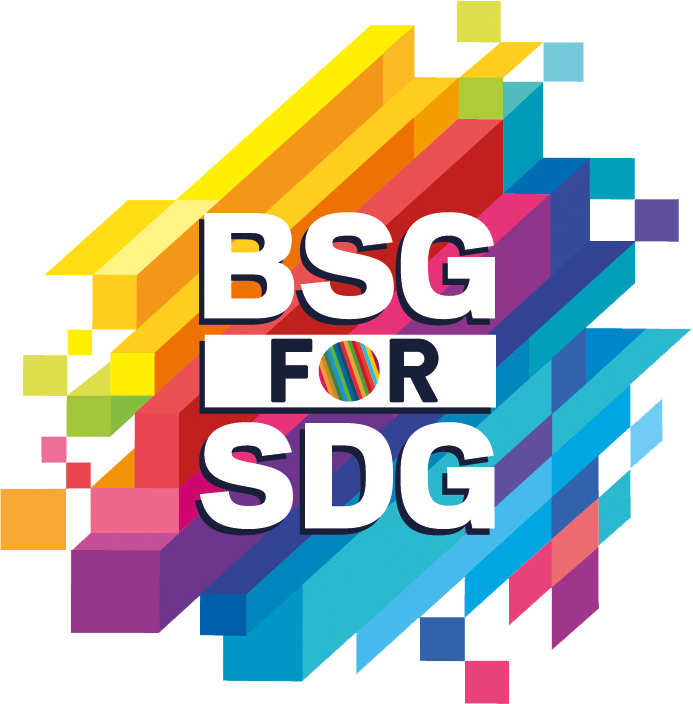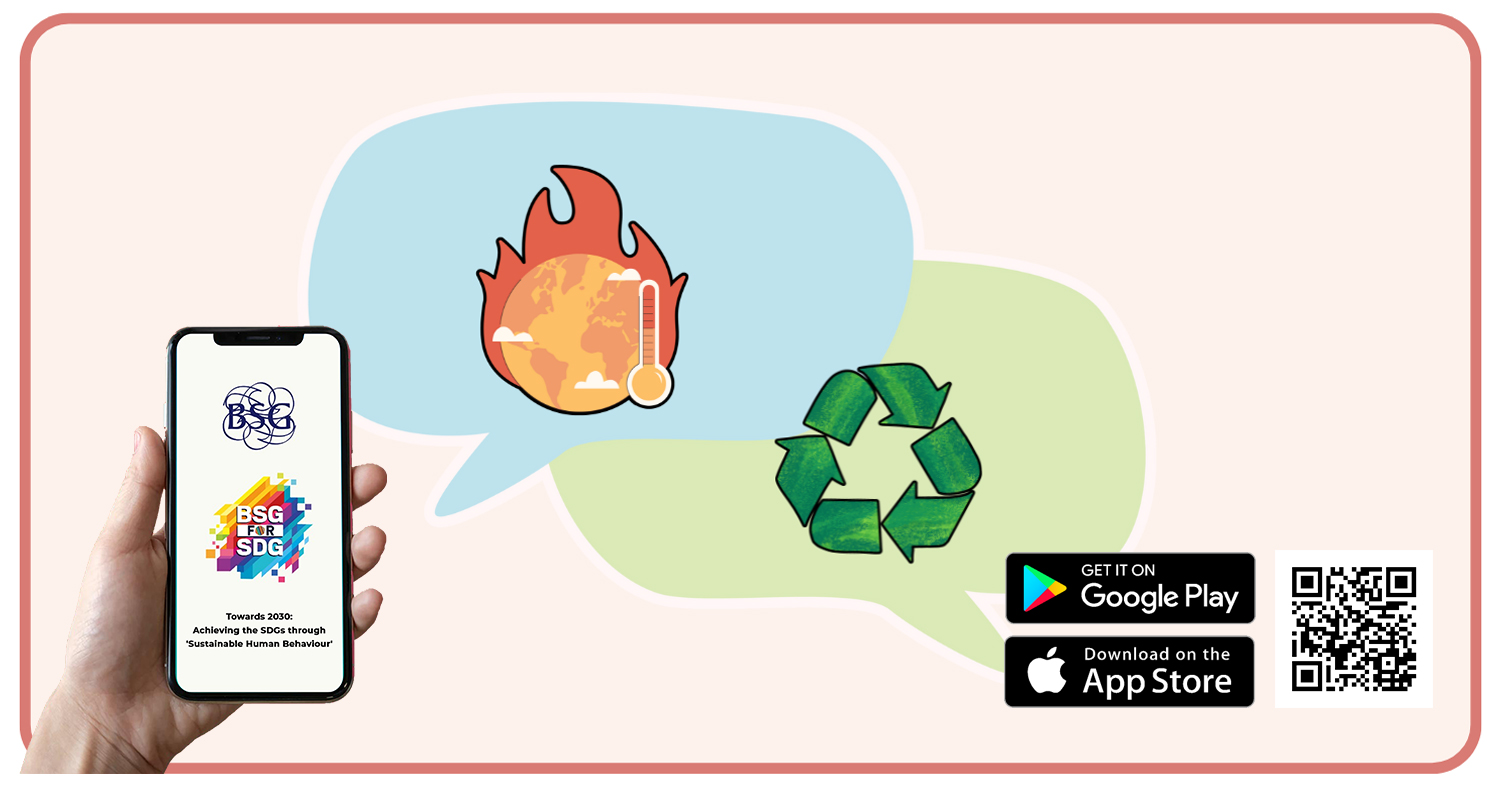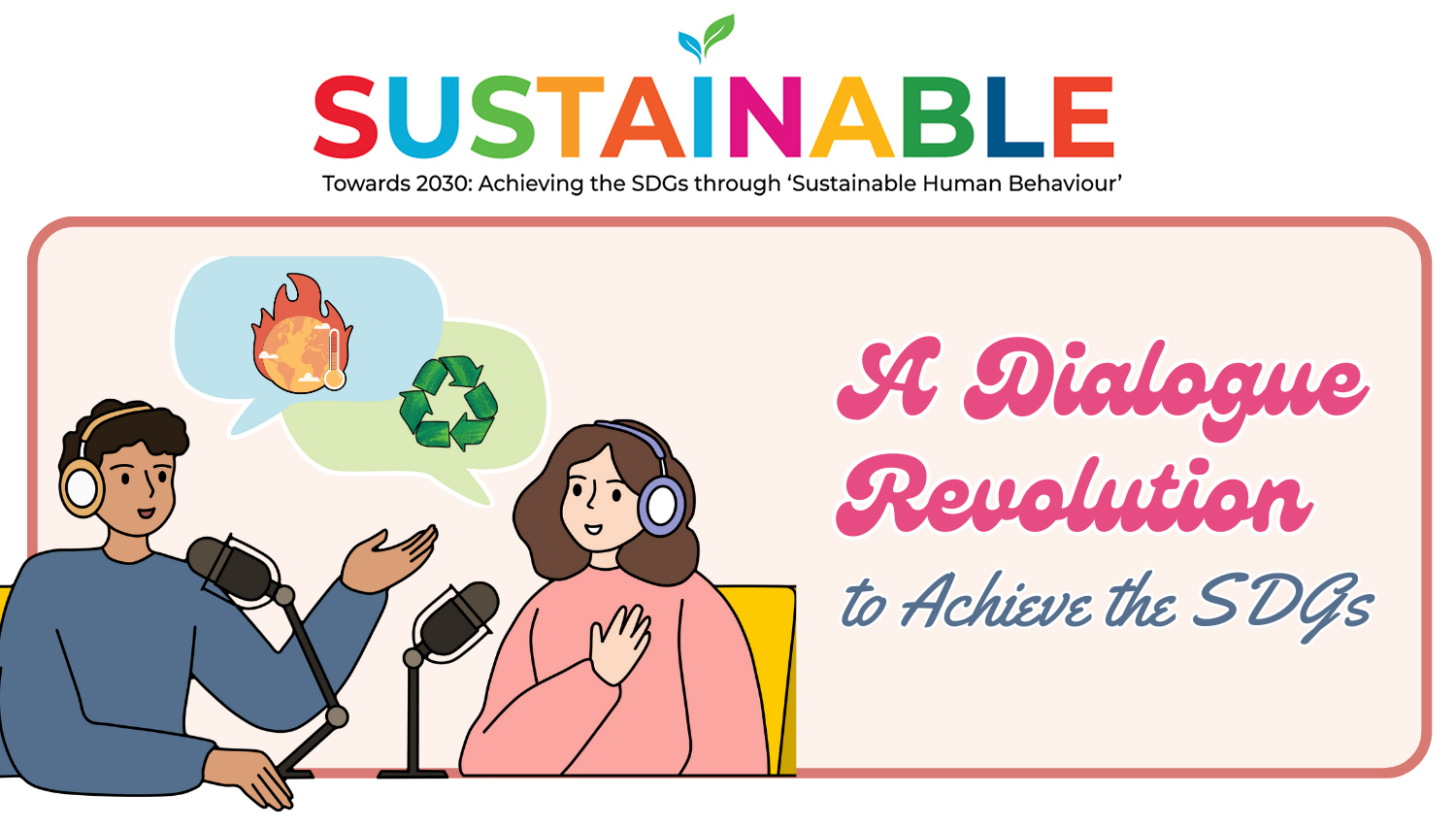

Greetings from BSG Chairperson Mr. Vishesh Gupta
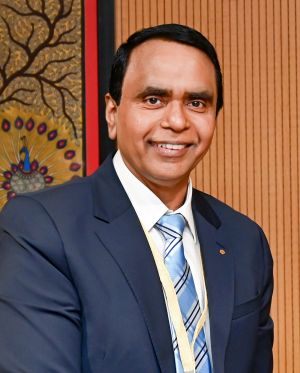
Dear Readers,
I wish you a joyful and inspiring start to the new year! I am full of hope that this year, too, we will remain committed to a sustainable lifestyle. The new year is like a blank canvas, inviting us to dream boldly and reimagine our contribution to the world. To fuel those dreams with fresh ideas and purpose, the ‘Sustainable Newsletter’ returns, ready to guide and inspire our journey towards a sustainable future.
On January 26, 1983, SGI Founding President Mr. Daisaku Ikeda presented his first annual peace proposal to the United Nations, initiating a new era of reflection and action for humanity’s future. To mark the 42nd year since the first Peace Proposal, this edition of the Newsletter honours President Ikeda’s vision for the world.
In the Peace Proposal titled “Peace through Dialogue: A Time to Talk”, he shared that the key to building a culture of peace lies in overcoming the barriers of discrimination and embracing the richness of human diversity. Dialogue, he proposed, is the means by which we can liberate ourselves from destructive attachments to abstract differences. Through genuine, heartfelt conversations, we can harness the true power of language—not to divide, but to connect; not to hurt, but to heal. In the same spirit, this time we are exploring the theme: A Dialogue Revolution to achieve the SDGs.
Many of our challenges today feel insurmountable, from environmental issues to social divides. But dialogue is where solutions begin. Every conversation you have—whether it’s about reducing waste in your household, advocating for green policies in your community, or having an honest talk with a colleague about shared responsibility—contributes to the larger picture of change. Like seeds planted in fertile soil, conversations hold the potential to grow into actions that transform lives and communities.
This newsletter celebrates that transformative power. Through real-world examples, it shows how dialogue has resolved conflicts, healed our planet, and inspired progress. Yet, beyond these global milestones, it reminds us of our individual role in this process. Whether through small acts of empathy or bold initiatives to unite others, each of us can be the catalyst for meaningful change.
As we embrace this theme, let us be inspired by President Ikeda’s enduring belief: the future of our planet will not be determined by power or wealth but by the conversations we choose to have and the connections we dare to build.
Warm Regards
Vishesh Gupta
Chairperson, Bharat Soka Gakkai
In October 1962, the world teetered on the edge of nuclear war. The Cuban Missile Crisis saw the U.S. and the Soviet Union locked in a dangerous standoff. But instead of launching missiles, leaders chose to talk. Through backchannel communications and tense negotiations, they reached a peaceful resolution, averting catastrophe.
Decades later, in 1987, dialogue proved equally powerful in a different context—the global fight against ozone depletion. The Montreal Protocol brought nations together to address the damage caused by chlorofluorocarbons (CFCs). Through collaboration and compromise, they agreed to phase out harmful substances, leading to the ozone layer’s recovery. It remains one of the most successful environmental agreements in history.
These examples remind us that dialogue is far more than a tool for diplomacy—it is the quiet force that can unravel even the most tangled challenges. From international agreements to local town halls, dialogue works because it invites diverse voices, builds trust, and sparks collective solutions.
During the global financial crisis of 2008, Norway’s social dialogue enabled stakeholders to negotiate wage moderation and job protection measures, helping the country maintain economic resilience. By prioritizing open communication and shared decision-making, Norway demonstrates how social dialogue can drive equitable and sustainable solutions.
The idea of dialogue aligns perfectly with SDG 17: Partnerships for the Goals, emphasizing the importance of collaboration in achieving sustainable development. The United Nations’ SDG Actions Platform serves as a global registry for voluntary commitments and multi-stakeholder partnerships supporting the Sustainable Development Goals.
For instance, the Global Partnership for Education (GPE) has used GPE grants to reach nearly 253 million children, including 103 million girls and 380,383 children with disabilities, across 76 countries.
But what does this mean for us? Dialogue isn’t just for global leaders or big conferences—it’s something we use every day, often without realizing its power. The words we choose and the way we express them can build bridges or deepen divides. Think about resolving a disagreement with a friend: a thoughtful phrase like “I understand your perspective” can shift the conversation from conflict to collaboration. Whether you’re brainstorming solutions for a cleaner campus, addressing social tensions in your community, or even discussing chores at home, the way we communicate matters. Language has the power to connect us, to clarify misunderstandings, and to inspire action.
In a world grappling with climate change, depleting resources, and deep social divides, the simple act of coming together to listen, understand, and speak with purpose holds extraordinary power. If words could pull us back from the brink of nuclear disaster and repair the ozone layer, what else might they mend? Perhaps, within our willingness to talk lies the blueprint for a greener, more just world.

Cultural Interpopulism
Cultural Interpopulism is about bringing different communities together to truly connect, learn from one another, and work toward common goals. It goes beyond surface-level cultural exchange and focuses on how diverse groups can join forces to tackle global issues like poverty, inequality, and climate change. By blending ideas, traditions, and innovations, cultural interpopulism promotes understanding and cooperation that break down barriers of nationality, ethnicity, or social status, paving the way for solutions that work for everyone.
Why It Matters
In an increasingly globalized world, cultural interpopulism offers a framework for addressing the pressing issues of our time. It highlights the importance of recognizing the interconnectedness of humanity and leveraging this connection to combat prejudice and division. For instance, the Forest Stewardship Council (FSC) involves indigenous communities in the sustainable management of forests, combining traditional ecological knowledge with modern forestry techniques. This collaboration not only helps preserve biodiversity but also ensures the cultural and economic well-being of local populations. By embracing cultural interpopulism, societies can turn diversity into an asset, promoting peace and cooperation rather than conflict and exclusion.
Cultural Interpopulism in Action
Successful examples of cultural interpopulism are all around us. For instance, the Seeds of Peace initiative brings together youth from regions of conflict, such as Israel and Palestine, to engage in dialogue and leadership programs. These efforts aim to build understanding and foster collaborative problem-solving among future leaders.
By adopting cultural interpopulism, we can inspire a movement where the richness of cultural diversity fuels progress, proving that no single group holds all the answers, but together, we are capable of solving global challenges.
 To Read
To Read

The Power of Dialogue
What does ‘dialogue’ truly mean and how can we harness its power? Find out through the article.

Hold an Idea Lightly – A Key Lesson for Dialogue
Developing flexibility of the mind turns out to be key in holding successful dialogues.
 To See
To See

How to Use the Socratic Method (for Dialogue, Debate, Critical Thinking)
The Greeks showed the world how intelligence does not exist in isolation. The truth is often discovered through collective reasoning. Find out how the Greek thinker, Socrates, led dialogues.

 To Listen
To Listen
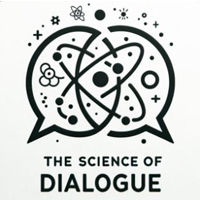
The Science of Dialogue
In this podcast series, educator Rod J. Naquin investigates meaningful dialogue, drawing on philosophy, linguistics, and psychology to examine the essence of human connection.
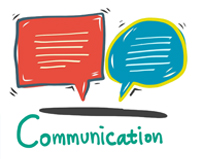
Reclaiming Conversation
In today’s world, much of our communication takes place through screens. While this shift has significantly improved the efficiency of how we connect, it has also brought about notable drawbacks, particularly with the decline of face-to-face conversations. In this podcast, host Brett McKay sits down with Dr. Sherry Turkle, author of the book “Reclaiming Conversation,” to explore what we lose when we move away from in-person interactions. Together, they delve into the downsides of relying on computers and smartphones for communication and discuss practical ways to reclaim meaningful conversations in our lives.
 To Play
To Play

35 conversation games to facilitate communication and interaction within individuals
Who says games are only for children? Research shows that engaging in fun games can help people of all ages develop essential skills and learn valuable life lessons. If the goal is to foster healthier communication and nurture the spirit of dialogue—whether at work or at home—these 35 games can be incredibly effective in achieving this objective.
Conversation games, or talking games, are structured activities designed to enhance communication and interaction, particularly in workplace settings. These games often integrate elements of collaboration and play, encouraging team members to engage in meaningful dialogues, share ideas, and build stronger relationships.
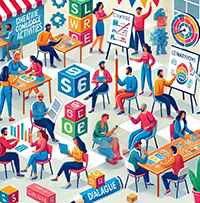
15 ways to level up your dialogue game: Creative dialogue activity ideas
One of the key ingredients for successful dialogue is strong communication skills. Imagine if there were a fun way to refine these skills while also learning to engage in meaningful conversations and build lasting friendships. Good news—there is! Here are 15 enjoyable activities designed to not only enhance your creative writing and communication abilities but also boost your confidence in the process.
In the Peace Proposal titled, “Peace through Dialogue: A Time to Talk”, SGI Founding President Mr. Daisaku Ikeda writes, “We must first succeed in transcending the excessive attachment to difference that is deeply rooted in the psychology of individuals, and we must conduct dialogue on the basis of our common humanity.” This profound insight reminds us that to create a more harmonious and equitable world, we must look beyond the surface of perceived differences and anchor ourselves in the shared essence of being human.
But this shift doesn’t begin with others; it begins within. True dialogue requires the courage to look deeply into ourselves, to confront our own prejudices and assumptions. Transformation is not just about changing the world; it is about challenging the narratives we carry within.
Our perceptions of good and evil are shaped by the lens of language and abstract concepts. In the same Proposal, President Ikeda writes, “The external manifestations of good and evil are relative and transmutable. They only appear absolute and immutable when the human heart is in thrall to the spell of language and abstract concepts.” The way we use language can either entrench division or open pathways to transformation. By freeing ourselves from rigid interpretations, we begin to see the potential for good even in what seems irreparably bad, reminding us that no conflict or difference is beyond resolution.
Even division and confrontation can be seen as evidence of our deeper interconnectedness. Further, he says, “We can even come to understand the confrontation of good and evil as elements of the semantic network of the human heart which, mediated through language and symbols, embraces the entire cosmos.”
The consequences of failing to address differences with understanding are stark. He continues, “We must not allow ourselves to fall captive to perceived differences. We must be the masters of language and ensure that it always serves the interests of humanity.” History teaches us the devastating consequences of dehumanizing others, showing how language can be wielded as a weapon. Dialogue, then, is not merely an option but a moral responsibility to reclaim language as a force for unity and understanding.
Members of the Soka Gakkai place dialogue at the heart of all their activities. From one-on-one interactions with neighbors and family members to joyful exchanges in small group discussions—popularly known as “discussion meetings”—and home visits to listen empathetically to others’ challenges, worries, and fears, the Soka Gakkai embodies its belief in the transformative power of dialogue. Through these efforts, hope-filled solutions are shared, and bonds of trust are built, reaffirming the organization’s conviction that dialogue can change the world. In his dialogue with sociologist and writer Elise M. Boulding, President Ikeda explains what makes Soka Gakkai International (SGI) a champion of social dialogue. He says, “In the SGI, we stress small meetings, called discussion meetings, based on openhearted, cheerful, and supportive dialogue.” He further notes, “We are thus confident that ours is a truly grassroots movement for peace and human rights.”
President Ikeda also emphasizes the importance of humility in dialogue: “Person-to-person dialogue with a sense of humility must be made basic to all intercultural and interreligious exchange.” At the core of these interactions is the unwavering respect for every individual, encapsulated in the Buddhist parable: “When you face a mirror and bow respectfully, the image in the mirror likewise bows to you respectfully.” Reassuring us of the profound impact of such sincere dialogues, President Ikeda asserts, “Conducted steadily, repeatedly, and tenaciously, one-on-one dialogue based on respect can advance the development of a global society of peace and harmonious coexistence.”
In the Peace Proposal, President Ikeda concludes, “Overcoming negative forms of attachment to difference—discrimination—and bringing about a true flowering of human diversity is the key to generating a lasting culture of peace.” This journey begins with the difficult but necessary task of transforming from within. The essence of dialogue is not to win or convince but to build a world where diversity is not merely tolerated but celebrated, where differences serve as stepping stones toward deeper collaboration. In this way, dialogue becomes the bridge that carries us from conflict to peace.
Transforming Lives Through Meaningful Dialogue Shilpi Gupta | Women’s Division | Delhi

In 2011, I became a voluntary member of Bharat Soka Gakkai, through which I encountered my lifelong mentor, SGI Founding President Mr. Daisaku Ikeda. Immersing myself in his writings profoundly shaped my ideologies and empowered me to take responsibility for creating a world of hope and peace. His words, “… humane dialogue has never been as lacking as it is today … This is what our society today needs most of all,” left an indelible impression on me and guided my journey over the last seven years. During this time, I have passionately pursued, understood, and enabled dialogue, inspired by my mentor’s belief in shaping a new society for future generations.
In 2013, I was serving as Vice President at an e-commerce grocery startup. While my professional and material needs were met, I found myself constantly searching for a greater purpose to which I could dedicate my life. Over the years, I reflected deeply on this internal void, engaging in meaningful conversations and keeping an open mind. Inspired by the ancient Vedic Sanskrit scripture Rig Veda, which teaches, “Aano bhadrah krtavo yantu vishwatah” (“Let noble thoughts come to me from all directions”), I focused on learning rather than seeking a singular mission statement.
As I engaged in dialogues with others, I realized that the process of conversation itself was transformative. Nearly every interaction left me enriched with new insights, a sense of happiness, and a determination to carve a new path for myself. Testing this realization, I initiated written dialogues with friends on diverse topics. These open-ended discussions were not bound by outcomes but aimed at exploring ideas collaboratively. One significant success from this initiative was when a close friend—a dancer and self-proclaimed cynic—choreographed a 10-minute piece on “hope for humankind” after weeks of discussions on the subject.
By 2018, my belief in the transformative power of dialogue had grown strong enough for me to leave my corporate career. I launched an initiative called “Joylogues” with the vision of transforming society through meaningful conversations. In its first year, I reached out to over 500 people, including entrepreneurs, teachers, and bloggers, and had enriching dialogues with about a dozen of them. These conversations provided invaluable insights and reinforced the potential of dialogue to make a tangible impact. By the second year, I began formulating structured methods for creating and facilitating platforms for dialogue, realizing the growing need to study this field academically. I discovered that while dialogue is ubiquitous, its conceptual depth is often overlooked. Historically, dialogue has played critical roles in various domains:
- As a pedagogical tool in India’s ancient Gurukul education system (1000-800 BCE).
- In literary compositions such as Buddhist texts from 13th-century Japan and Mahatma Gandhi’s Hind Swaraj (1909).
- As an instrument for global diplomacy, exemplified by the United Nations’ designation of 2001 as the Year of Dialogue Among Civilizations and 2023 as the International Year of Dialogue as a Guarantee of Peace.
- In governance, through traditional village councils (panchayats) and their deliberative practices.
- In cognitive development, as advocated by psychologists like Lev Vygotsky and Jerome Bruner.
Dialogue has also become a modern managerial tool for fostering stakeholder relationships and innovation, championed by experts such as Daniel Yankelovich and William Isaacs. Additionally, the podcast industry—with over four million active podcasts and nearly 500 million listeners—is a contemporary testament to the power of meaningful conversations.
Despite its widespread applications, dialogue remains underexplored as a unified academic discipline. This realization has become my life’s purpose: to develop a comprehensive theory of dialogue that can be taught and studied in higher education institutions worldwide. Concurrently, I am working to create professional opportunities for dialogue practitioners, ensuring that this academic pursuit translates into impactful practice.
In recent years, I have led two research projects with the State Council of Educational Research & Training (SCERT), Delhi, to observe dialogue levels in classrooms across age groups. We developed a research framework and an observational tool to measure these levels. I am currently authoring a reference book, tentatively titled “Classroom Dialogue,” mandated by SCERT Delhi, aimed at raising awareness about the importance of teacher-student dialogue in enhancing learning outcomes. Additionally, I am advocating for the inclusion of dialogue-focused courses in B.Ed. curricula.
I have developed undergraduate courses on dialogue’s role in business and human resource management, recently introduced through a guest lecture at Delhi Skill & Entrepreneurship University. Furthermore, I have partnered with a UK-based university to create dialogue programs for students in India. My training programs, conducted for domestic and international organizations, have attracted participants from Germany, Pakistan, Sri Lanka, and Bangladesh, fostering a global understanding of dialogue’s practical applications.
The journey has been long and challenging, constantly testing my resilience. For every 100 people I meet, 99 assure me that I will fail. Yet, each setback strengthens my belief in the transformative potential of dialogue. By working to promote dialogue, I have been able to contribute towards Sustainable Development Goal (SDG) 17—”Partnerships for the Goals.” Moreover, I am confident that engaging in dialogue is the key to achieving all 17 SDGs. The more openly we converse as a civilization, the faster we can find solutions to the pressing challenges our world faces today.
As President Ikeda said, “This is what our society today needs most of all.” I remain steadfast in my conviction that true dialogue can significantly reshape how humanity interacts, understands, and responds to one another.
 SDG Tip for Daily Life
SDG Tip for Daily Life
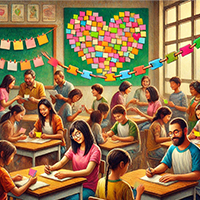
Start an Appreciation Chain Reaction
Next time you’re in a group, challenge everyone to appreciate someone else sincerely. It can be about their ideas, efforts, or even how they brighten the space around them.

Why it works:
Positive dialogue fosters trust and collaboration, creating a ripple effect of kindness and cooperation. A culture of appreciation can lay the foundation for solving even the toughest challenges—together!
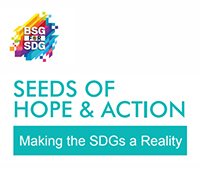
Updates
BSG has now Successfully Held over 200 SOHA Exhibitions
The ‘Seeds of Hope and Action (SOHA): Making the SDGs a Reality’ exhibition has travelled to 200 destinations across the country, including: Chandigarh, Amritsar, Jaipur, Delhi, Karaikal, Gangtok, Kalimpong and Hurda, Rajasthan
Read more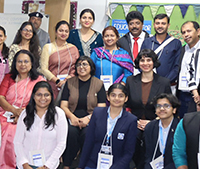
BSG Joins International Conference on “Educating for Sustainability Action” Organized by CEE, Ahmedabad
The Centre for Environment Education (CEE) hosted the international conference “Educating for Sustainability Action” from January 9–11, 2025, at its Ahmedabad campus. Designed to position education as a pivotal driver of sustainability, the event brought together around 500 delegates, including 100 international participants from renowned sustainability-focused institutions. Attendees included environmental professionals, policymakers, academics, practitioners, and youth leaders.
Read moreContact Us
 Any queries or suggestions regarding the newsletter can be addressed to sdg@bharatsokagakkai.org
Any queries or suggestions regarding the newsletter can be addressed to sdg@bharatsokagakkai.org
 To know more about the ‘BSG for SDG’ initiative, visit the BSG for SDG website
To know more about the ‘BSG for SDG’ initiative, visit the BSG for SDG website
 Download the ‘BSG for SDG’ mobile app with the carbon footprint calculator
Download the ‘BSG for SDG’ mobile app with the carbon footprint calculator
